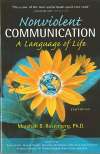By Barbara Nicholson, cofounder of Attachment Parenting International (API) and coauthor of Attached at the Heart

 Over the last several years, I have been reading Dr. Marshall Rosenberg’s classic book, Nonviolent Communication, and sharing some of his pearls of wisdom with my adult sons. Oh, how I wish I had this book when they were very young! And how I wish I had the wisdom to model this kind of communication for my children as we were dealing with sibling rivalry and other normal challenges of family life.
Over the last several years, I have been reading Dr. Marshall Rosenberg’s classic book, Nonviolent Communication, and sharing some of his pearls of wisdom with my adult sons. Oh, how I wish I had this book when they were very young! And how I wish I had the wisdom to model this kind of communication for my children as we were dealing with sibling rivalry and other normal challenges of family life.
When we’re all together eating, playing games, or watching TV, my husband and I are amazed at how the “old tapes” can get played: The same dynamics that you think adults outgrow can rear over such insignificant comments! Four adult children with four very unique temperaments, talents and interests make for interesting combinations, to say the least. But no matter what the issue, it’s affirming to see how well the Nonviolent Communication (NVC) tools work!
There were several times when a simple misunderstanding could have escalated into a full-blown argument; however, reminding ourselves of what the core issue was — the feeling that was felt, the need that was identified — diffused the situation into an opportunity to really see the big picture. So often we don’t want to take the time to dig a little deeper, thinking that it’s too time consuming, yet arguments can linger over the rest of the day, creating a pall over what should be a loving day of connection and respite from our busy lives.
In my ideal world, not only would parents model these communication tools for their children, but teachers would be taught these methods in all training programs. What a gift for a teacher to be able to help her students who are having an argument on the playground to identify their feelings and unmet needs, to see that we have a universal vocabulary of feelings that are web of strength, not a weapon of name calling and division.
If this became our language of connection, we might even be able to change the way we communicate in business and government, changing our whole society in such a way that mediation becomes more the norm than the exception.
When I see my sons using NVC tools, even though it might be a little stiff and even though I usually have to initiate the conversation, I see the potential that all families have to greatly improve their quality of family life. It’s even a great tool to use with grandparents and other family members, especially over the holidays or other events when we’re in close quarters for extended periods of time. It’s a reminder to be a good listener, take the time to go a little deeper in our understanding of each other and truly bring some peace into the home.
Many communities now have NVC practice groups, and I encourage all API Support Groups to look into inviting an NVC-trained group leader to visit and perhaps lead a practice session at a meeting. It is a simple technique that we can use in every relationship, increasing our vocabularies at the same time! As Dr. Rosenberg states, this is a whole new language and essential to creating a more peaceful society. Of course, that — peace — is what we all want in our homes and communities.
